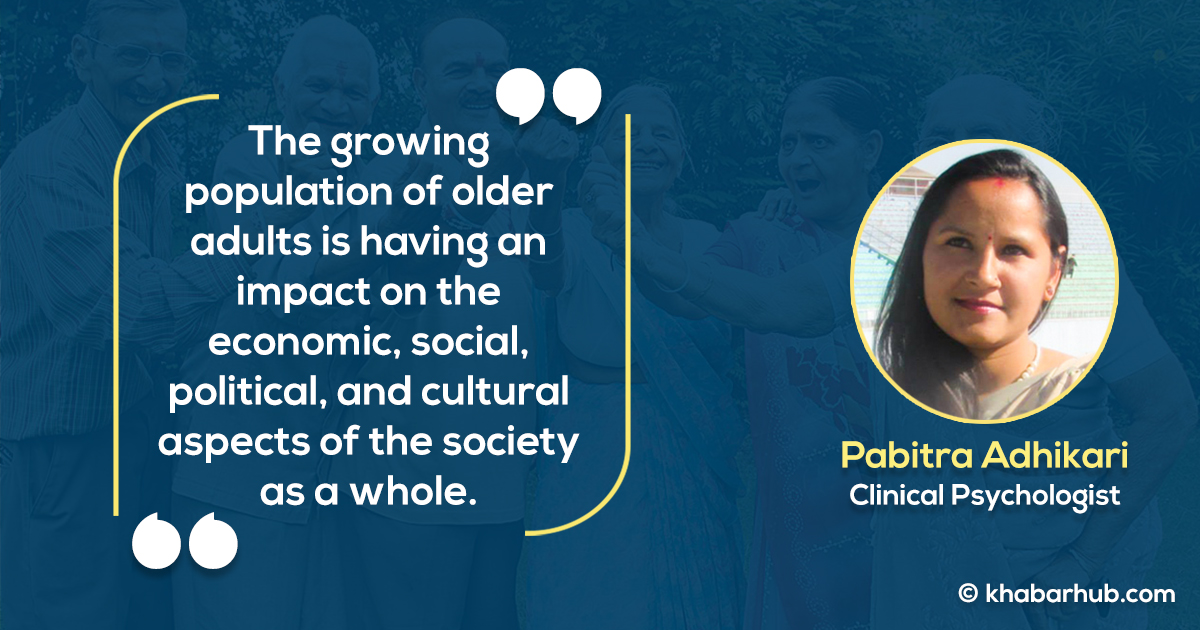The International Day of Older Persons (IDOP) is observed on October 1 each year.
The decision to observe IDOP on October 1st was taken by the United Nations for the first time in 1991.
The day is celebrated annually to recognize the contributions of older persons and to examine issues that affect their lives.
The United Nations General Assembly on December 16, 1991, established the principles of the rights of older persons in which their independence, participation, care, self-fulfillment, and dignity are emphasized.
The growing population of older adults is having an impact on the economic, social, political, and cultural aspects of the society as a whole.
IDOP is important to continue to build public awareness about the effects of those impacts. This day is also important for all as it raises public awareness about the principles of rights proposed by the United Nations.
IDOP provides an opportunity to strengthen their wellbeing and acknowledge the contribution, wisdom, dignity, and needs of our senior citizens.
COVID-19 affects the ageing population’s daily life by accentuating loneliness and helplessness which in turn leads to various mental disorders.
In Nepal, this day has been observed with organizing various programs/events by both government and private sectors.
At present, Nepal’s population growth rate is 1.4% and it is declining. The population growth rate of senior citizens is 3.5% and it is increasing.
Due to the development of health services and its accessibility, the average life expectancy of Nepalese is increasing.
The whole world is paying attention to the ever-growing population of older adults of 60+ age. About two-thirds of the world population of older people reside in Asia countries.
So observing IDOP and understanding its purpose is more so important for Asian countries.
This year the 30th anniversary of this IDOP’s theme given by the United Nations is “Pandemics: Do They Change
How We Address Age and Ageing?” Most of this year’s events will be virtually due to COVID-19. The 2020 theme aims to:
Inform participants about the strategic objectives for the decade of Healthy Ageing.
Raise awareness of the special health needs of older persons and of their contributions to their own health and to the functioning of the societies in which they live.
Increase awareness and appreciation of the role of the health care workforce in maintaining and improving the health of older persons, with special attention to the nursing profession
Present proposals for reducing the health disparities between older persons in the developed and developing countries, so as to “Leave no one behind”.
Increase understanding of the impact of COVID-19 on older persons and its impact on health care policy, planning, and attitudes.
“The COVID-19 pandemic is causing immense fear and suffering for older people across the world. Beyond its immediate health impact, the pandemic is putting older people at greater risk of poverty, discrimination, and isolation. It is likely to have a particularly devastating impact on older people in developing countries,” said António Guterres-UN Secretary-General.
Most of the older adults love to visit religious places and spend time involving religious activities. But in the pandemic period, they can’t do these types of activities.
As cases of the Coronavirus continue to rise worldwide, researchers have learned that older adults are more vulnerable.
According to health specialists, its major symptoms can be more adoptive in older adults easily. Infected from this virus results in respiratory illness, which can cause pneumonia and show symptoms such as fever, cough, and shortness of breath.
It has become a pandemic issue all over the world no curative vaccine is found until now.
COVID-19 affects the ageing population’s daily life by accentuating loneliness and helplessness which in turn leads to various mental disorders.
They get restricted to do their regular exercise, which hampers their daily physical health and wellbeing. As a result, negative consequences can be found mainly on the digestive system.
They should maintain their workout inside their house which can help them to remain in good physical health.
Similarly, this pandemic situation does not facilitate them to go for banks and any other co-operatives, in this situation they will face economic burden which directly or indirectly disturbs the fulfillment of their daily basic needs and especially medicine.
If regular medicines like, blood pressure, sugar, asthma, heart diseases are not stored it makes older adults and family members also suffer.
Family members should take the pandemic period as one of the golden opportunities to spend time with our seniors. It is an opportunity to transfer knowledge, skills from the seniors.
Most of the older adults love to visit religious places and spend time involving religious activities. But in the pandemic period, they can’t do these types of activities.
It may affect their spiritual feelings and emotions.
It has become a matter of interest and concern for everyone about how to manage the ageing population during the pandemic.
To address this situation government should bring some relief policies and programs for ageing populations.
Older adults should follow the instruction given by the government and the World Health Organization. Maintain social distance and fellow safety rules.
There is the most important role of family members to support older adults to keep safe and healthy.
Family members should take the pandemic period as one of the golden opportunities to spend time with our seniors. It is an opportunity to transfer knowledge, skills from the seniors.
Positive thinking, behavior, care, and attitude towards older adults make them strong to fight with Corona Virus.
(Pabitra Adhikari is a Clinical Psychologist)









Comment